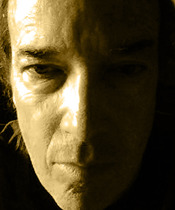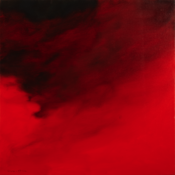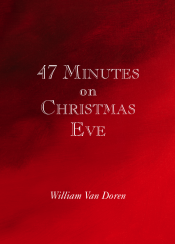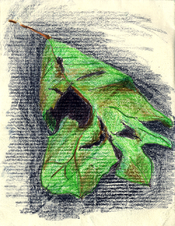Sunset, Thursday, 15 October 2009
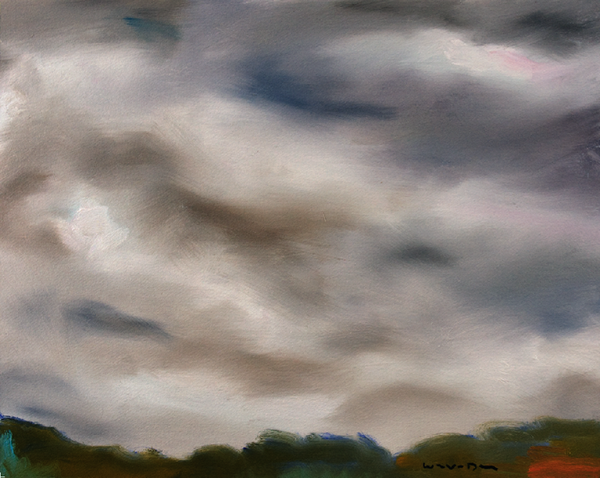 William Theodore Van Doren. Stony Point, Albemarle County, Va. Oil on paper, 16 x 20.
William Theodore Van Doren. Stony Point, Albemarle County, Va. Oil on paper, 16 x 20.
Rain and 46°F.
Yesterday Bob Leweke, morning host on regional NPR station WMRA, introduced the weather forecast this way: “For the next few days we have a 100% chance of dreary.” It’s a little bit difficult to gauge the situation now from here, but late this afternoon as I drove along the Southwest Mountains the clouds were only a few hundred feet above the ground.
Usually at times like this, in painting I look for the light, even if another observer of the sunset would probably say it wasn’t really there at all. Either that, or go with the darkness. An example of that approach that I like is the next-to-last sunset in the few paintings I’ve been able to photograph so far from 1997 – November 6th, from down by the railroad tracks in Charlottesville, near the University of Virginia Medical Center.
Actually, now that I look again at that painting, and yesterday’s, I realize what’s happening is both the light and the dark.
While I’m referencing WMRA, I’d like to recommend a fine blog by their super-producer Martha Woodroof, who is, among many other things, one of the best writer-reporters anywhere. You’ll sometimes hear her stories on national NPR. I’ve recently added a standing link to Martha’s blog at the side of this page.
On the 12th, Martha’s post started out with the furor over Rush Limbaugh’s efforts to buy the NFL’s St. Louis Rams. This got her into the subject not simply of Limbaugh’s controversial status but his popularity as a commentator.
I had hoped our romance with polarization had ended on election day, but it appears that it hasn’t – if, that is, Rush Limbaugh’s ratings are any way to take the national pulse. And I don’t mean to pick on Limbaugh. He’s just such a clear-cut example of the kind of figurehead ranters we Americans spend our time listening to.
We elected President Obama in what appears to have been a brief flirtation with the concept of consensus and civility. Yet how impatient we have become with his efforts at consensus-building, his incessant information-gathering, his unfailing politeness in response to rudeness.
Is consensus-building just too much work for us as a culture? Is arguing and fighting about getting what we want, when we want it, too ingrained in us to allow serious consideration of reasonable compromise? Could it be that we are actually more comfortable, as a culture, wading through the wake of polarization left by The Decider et al.? Can we change our political conversation to one of consensus-building without being willing to change our own conversational tastes?
I had heard Martha talk before about the need for civil discourse and debate but hadn’t thought much about it, perhaps because I don’t feel all that civil myself on many hot-button topics. In other words, I didn’t see how things could really be any different. But something in her column jumped a spark for me.
I remembered reading not long ago how Nixon-Agnew (with the speechwriting help of Pat Buchanan) launched a successful ‘wedge’ strategy that has been expanded, developed and refined to this day – and they did this in part by personifying political positions. Some positions belonged to effete disloyal hippies – and others to patriotic true Americans of the silent majority. From that period, and increasingly during the traumas wrought by the previous administration, political positions, political opinions, have become no longer something we THINK, but something we ARE. We can’t talk to each other anymore because we’re not just talking about debatable topics of interest ‘out there’ (outside of ourselves), we’re protecting our very identities, ‘in here’ ... the whole thing was made very personal and we take it personally. When political controversy arises, many of us can hardly breathe, much less settle down and have a reasonable debate. As much as we may not think we agree with the personification of politics, many of us suffer from its consequences and its ongoing influence.
 Thursday, October 15, 2009 at 08:00PM | by
Thursday, October 15, 2009 at 08:00PM | by  BVD | in
BVD | in  A Painting A Day,
A Painting A Day,  Sunset Paintings,
Sunset Paintings,  Sunsetology | tagged
Sunsetology | tagged  Barack Obama,
Barack Obama,  Bob Leweke,
Bob Leweke,  Martha Woodroof,
Martha Woodroof,  Pat Buchanan,
Pat Buchanan,  Richard Nixon,
Richard Nixon,  Rush Limbaugh,
Rush Limbaugh,  Southwest Mountains,
Southwest Mountains,  Spiro Agnew,
Spiro Agnew,  St. Louis Rams,
St. Louis Rams,  WMRA,
WMRA,  politics,
politics,  rain | | Comments Off
rain | | Comments Off 
